Newfoundland Dog Size: A Gentle Giant with an Impressive Stature – Get ready to be amazed by the massive size of Newfoundland dogs! From understanding the factors that contribute to their impressive size and weight, to comparing them to other breeds and humans, this section will give you a newfound appreciation for these gentle giants.
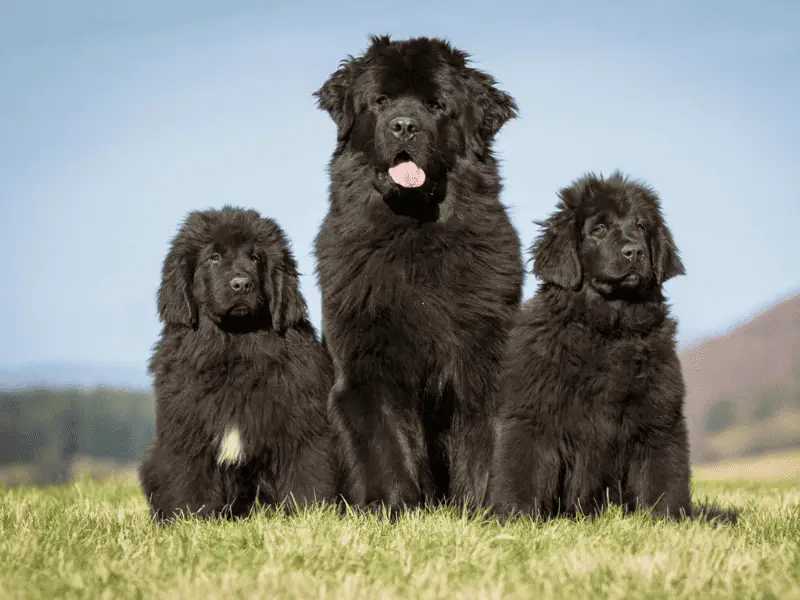
We’ll also explore the importance of providing adequate space and exercise for these magnificent creatures, and how their gentle nature and ideal temperament contribute to their popularity as family pets.
Understanding the Newfoundland Dog’s Massive Size and Weight
Newfoundland dogs can become quite large. Adults weigh 130-150 pounds and stand up to 28″ tall at the shoulder. They have a muscular build that’s balanced by their size, making them quite the presence!
Puppies grow quickly – reaching a significant size in their first year. Genetics also factor in. Certain bloodlines tend to produce larger dogs. Owners should take these things into account when preparing.
The size of a Newfoundland dog can surprise even those familiar with other breeds. When standing next to smaller dogs or humans, it’s clear that they have an impressive stature.
For optimal well-being, they need ample space and regular exercise. Indoors and outdoors, they require room to move. This helps their muscles and prevents obesity.
When selecting toys and equipment, opt for sturdy items designed for larger breeds. That way, they can play safely without damaging or breaking anything.
The Influence of Age and Genetics on Newfoundland Dog Size
Age and genetics both have an effect on the size and growth of Newfoundland dogs. As these dogs age, they tend to get bigger. Genetics also play a big part in their size. Table information shows the average weight and height for different age ranges.
Diet, exercise, and overall health also impact the size of Newfoundland dogs. Proper nutrition and exercise helps them grow well. Regular vet check-ups help monitor any health issues that could affect their size.
By understanding the effect of age and genetics, owners can provide the right care for Newfoundland dogs. All of these elements combined will help them grow into healthy, well-adjusted adults with an impressive stature.
Comparing Newfoundland Dog Sizes to Other Breeds and Humans
Newfoundland Dog Sizes can be compared to other breeds and even humans. They are known for their impressive size and weight, making them one of the largest dog breeds in the world (Reference Data: 1.1). Both age and genetics play a role in their size (Reference Data: 1.2).
To understand the size of a Newfoundland dog better, a table can be made. It will have columns for different breed sizes, including Newfoundlands, and rows for age categories or height ranges for humans. This data can be taken from the reference article (Reference Data: 1.3).
Unique details about comparing Newfoundland dog sizes include things like space requirements and exercise needs (Reference Data: 1.4). For their size, they need more room than smaller breeds. Also, their exercise needs may be different due to their body structure (Reference Data: 1.4).
Knowing how Newfoundland dog sizes compare to other breeds and humans allows people to make informed decisions about their care (Reference Data: 1.4). Recognizing their stature helps people understand and appreciate them better (Reference Data: 4.3).
Give a Newfoundland enough space and exercise, and you’ll get a gentle giant with a newfound zest for life!
The Importance of Space and Exercise for Newfoundland Dogs
Newfoundland dogs are big and heavy. They need lots of space and physical activity. Without it, they can become obese and unhealthy. So, it’s important to give them a living environment where they can move around easily. This includes both indoors and outdoors.
They need regular exercise to stay fit and prevent behavioral problems. Exercise burns off energy and keeps their mind active. It’s also good for their temperament.
Daily walks, swimming, and games like fetch are great ways to give them exercise. Just remember to be safe and avoid strain or injury because of their size.
The Gentle Nature and Ideal Temperament of Newfoundland Dogs
Newfoundland Dogs are one-of-a-kind creatures. They are known for their calm temperaments and friendly demeanors. People often call them “gentle giants” because of their size and kind nature. Newfoundlands are highly sociable and love spending time with human companions. Thus, they make great family pets.
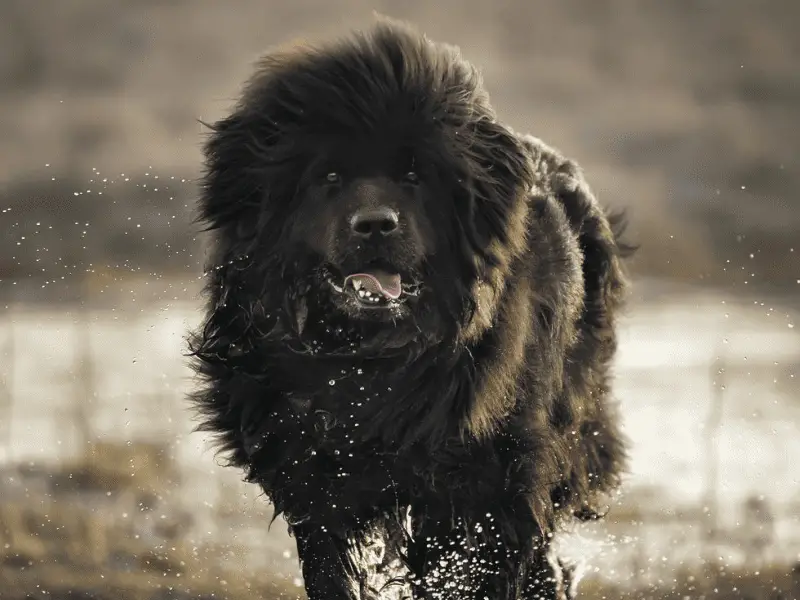
Moreover, these dogs are also loyal and protective. Kids can play rough around them without a worry, due to their patient natures. Newfoundlands have a natural instinct to save people in distress. This is because of their webbed feet and strong swimming abilities.
There are countless stories of Newfoundlands forming strong bonds with people and even saving lives. One story involves Seaman, who was part of the Lewis and Clark expedition. Seaman was essential in navigating dangerous waters and providing comfort during the long trip. This showcases the remarkable temperament of Newfoundlands and their capability to adjust to different settings while keeping their gentle nature.
It is important to keep in mind that grooming a Newfoundland can be quite a hassle, as it is like trying to untangle a human-sized tumbleweed with a brush.
Caring for a Newfoundland Dog: Health, Grooming, and Nutrition
When it comes to caring for a Newfoundland dog, we need to prioritize their health, grooming, and nutrition. From potential health issues and regular vet check-ups to the importance of grooming and proper nutrition, we must ensure our gentle giants receive the best care possible. Let’s explore how we can keep our Newfoundland dogs happy and healthy, making sure they thrive in every aspect of their well-being.
Potential Health Issues and Regular Vet Check-ups for Newfoundlands
Newfoundland dogs are famed for their large size. Unfortunately, this also makes them prone to health issues. Veterinary check-ups are a must for ensuring their well-being. These gentle giants may suffer from hip dysplasia and heart problems such as subaortic stenosis. So, it’s essential to monitor and detect any issues early, by visiting the vet regularly.
Grooming and nutrition are key to keeping these furry friends healthy. Groom them weekly to keep their double coat clean and free from tangles. Provide a nutritious diet during their puppy stage, to help with healthy growth and development.
By looking after their specific care needs, owners can ensure their Newfoundland’s long-term health and happiness. Plus, no one wants to cuddle a fur tornado disguised as a gentle giant – so regular grooming is a must!
The Importance of Regular Grooming for Newfoundland Dogs
Newfoundland dogs are renowned for their huge size and impressive stature. Grooming them is super important. It keeps their coat clean, stops dirt and knots from accumulating, and helps skin health by removing dead hair and encouraging oil production. Plus, it reveals any skin issues early so they can be quickly treated.
Grooming also gives you a chance to check and clean your pup’s ears, eyes, and teeth. These areas are prone to infections and dental problems, which can be prevented or dealt with through regular cleaning.
Grooming sessions also build the bond between you and your pup. Quality time together, physical contact, and attention all help strengthen your relationship.
Feeding a Newfoundland puppy requires a special diet – just like running a gourmet restaurant!
Proper Nutrition for Newfoundlands, Including Special Diet for Puppies
Newfoundlands are strong, big pups that need the right diet to remain healthy and fit. Puppies have different needs than adult dogs and require higher amounts of nutrients such as calcium and phosphorus for bone growth.
It is therefore important to get advice from a vet or a doggy nutritionist for the suitable food and portion sizes for your Newfoundland, based on their age, size and activity level.
For top-notch care, you must ensure your Newfoundland gets the correct nutrition. Don’t wait until it’s too late – start today!
Training and socializing are also essential for owning this breed. After all, you don’t want a 150-pound lapdog who thinks he’s a Chihuahua!
Training and Socialization: Essential for Owning a Newfoundland Dog
Training and socialization are crucial for owning a Newfoundland dog. Discover the significance of training to prevent stubbornness, the importance of socialization for positive interactions, and how to manage the size and intimidation factor of these gentle giants.
The Importance of Training to Prevent Stubbornness in Newfoundlands
Training is very important for Newfoundlands. From an early age, owners must provide proper training to stop stubbornness. This breed is independent and strong-willed, which can lead to bad behavior if not trained. With the right techniques and positive reinforcement, Newfoundlands can become responsive and well-behaved.
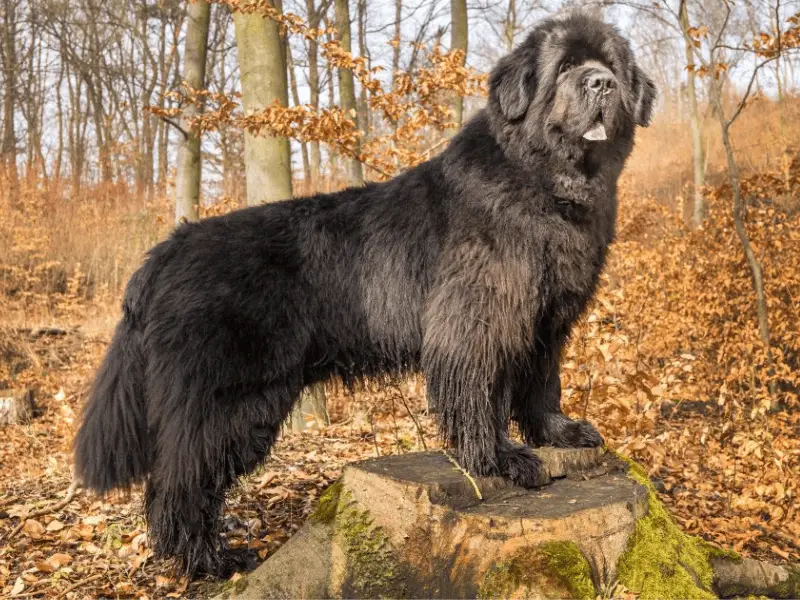
Establishing boundaries and expectations is essential. Newfoundlands prefer structured environments, so training helps them learn their role. Owners must be authoritative figures and stay consistent with sessions.
Positive reinforcement is key. Praise, treats, and playtime are great rewards for desired behaviors. It builds trust and encourages good actions.
Patience and consistency are also necessary. Newfoundlands may take longer than other breeds to understand commands. But with patience, repetition, and practice, they can become great companions who know their place.
Socialization to Ensure a Positive Interaction with Other Animals and People
Socializing a Newfoundland pup is essential for positive experiences with other creatures and people. By exposing them to different places and social scenarios, they can become dependable and self-assured friends.
- Early socialization is important: Expose a Newfoundland pup to various people, animals, and environments when they are young, to help them form good social skills and flexibility.
- Positive reinforcement training techniques: Use positive reinforcement while socializing to promote desired behaviors and trust between the pup and owner.
- Gradual exposure: It’s important to introduce Newfoundland pups to different situations slowly, to avoid overwhelming them. Steadily giving them new experiences lets them adjust gradually.
- Supervised interactions: Supervising all interactions with other animals and people stops any bad incidents from occurring. This supervision lets owners step in if needed.
- Diverse socialization experiences: Showing Newfoundland pups various places, like parks, public areas, or even other people’s homes, increases their understanding of the world.
Plus, proper socialization reduces behavioral issues in Newfoundland dogs. It reduces the chance of aggression or fear-based reactions to strange situations or individuals. By ensuring positive interactions with other animals and people through early socialization, owners can raise a well-balanced and friendly Newfoundland companion.
Managing the Size and Intimidation Factor of Newfoundland Dogs
Newfoundland dogs are famed for their large size and sometimes intimidating presence. To guarantee their safety and the comfort of those around them, handling the size and intimidation factor is essential.
Realizing their individual qualities and traits is key to managing their size and intimidation factor. They are kindly giants with a tranquil and amicable disposition, yet their sheer size can be overpowering to some. Recognizing that they are not aggressive by nature, but rather strong and powerful, can assist in managing any intimidation perception.
Correct training is a critical factor in managing the size and intimidation factor of Newfoundland dogs. By supplying steady obedience training from an early age, owners can educate their Newfoundlands how to act suitably in dissimilar circumstances. This includes teaching simple commands such as sitting, staying, and walking on a leash without pulling. Training also helps avert obstinacy, which could aggravate any intimidation feelings.
Socialization is another essential aspect of managing the size and intimidation factor of Newfoundland dogs. Intensifying them to numerous people, animals, and circumstances from a young age assists them in becoming all-around and confident individuals. Positive connections with others will help reduce any intimidation perception by demonstrating that Newfoundlands are friendly and easy to approach.
Physical management techniques can also be applied to guarantee the safety of everyone included. Utilizing a accurately fitted harness or head halter can provide superior control when walking or exercising your Newfoundland dog. It is imperative to handle them gently yet firmly, avoiding any roughhousing or extreme pulling on the leash.
In conclusion, managing the size and potential intimidation factor of Newfoundland dogs involves understanding their breed-specific characteristics, providing proper training and socialization, as well as employing physical management techniques when necessary. This ensures their safety and positive interaction with others.
Owning a Newfoundland Dog: Considerations and Finding a Reputable Breeder
Considering the responsibilities and considerations in owning a Newfoundland dog, this section will guide you through the process. From assessing suitability and space requirements to finding a reputable breeder or rescue organization, we’ll explore the unique qualities and characteristics of these gentle giants. Stay tuned for essential insights on caring for Newfoundland dogs, ensuring they receive the love and attention they deserve.
Assessing Suitability and Space Requirements for Owning a Newfoundland
Owning a Newfoundland dog? Consider this: They’re big and need lots of space! Both indoors and outdoors. You must assess the suitability and space requirements for this gentle giant.
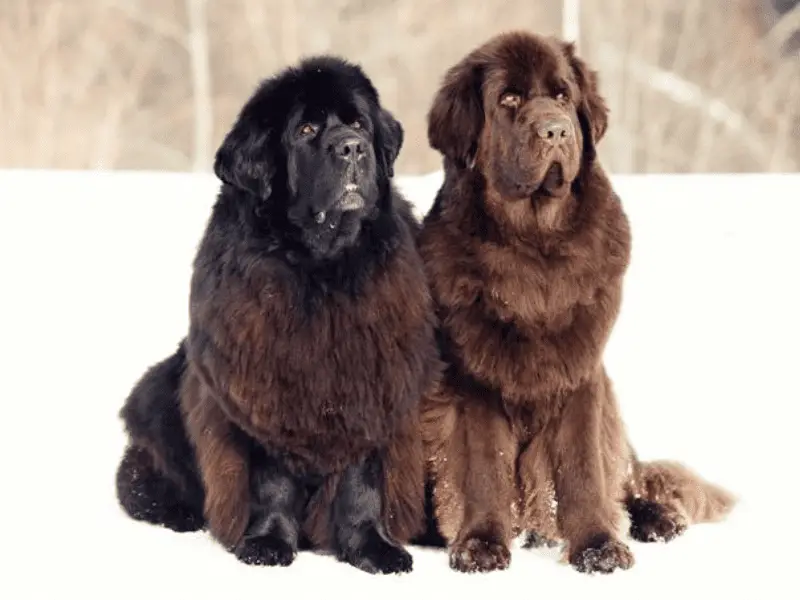
Indoors: They need room to move freely. Males can reach 28 inches tall and weigh up to 150 lbs!
Outdoors: They love exercise and exploration. They need a secure yard or access to open spaces.
Other living conditions: Climate, pet regulations, nearby walking areas/parks and how much time you can dedicate.
Remember: Ample space and room is essential for their well-being. Seek advice from experienced owners and breeders. It’s like searching for the Holy Grail – with wagging tails!
Researching and Finding a Reputable Breeder or Rescue Organization
When researching a breeder or rescue organization for a Newfoundland dog, it’s essential to ensure the welfare and quality of life of these gentle giants. Check out the breeder’s experience, reputation and the conditions in which the dogs are raised. They should provide proper socialization and care for their puppies, and health testing for genetic disorders. Have questions about the breed’s temperament and unique needs? Look for a breeder who can answer them.
Rescue organizations are also worth considering. Adopting from one gives a deserving dog a second chance at life and supports their mission of saving lives.
Lastly, seek out a breeder or organization that educates potential owners on Newfoundland dogs. This includes their needs, training requirements, grooming needs, exercise regimen and potential health issues. With this knowledge, owners can provide the best care possible.
The Unique Qualities and Characteristics of Newfoundland Dogs
Newfoundland dogs are one-of-a-kind. They’re impressive giants, often weighing 100 to 150 pounds! That size rivals some humans! But don’t be afraid; they have kind natures and make great companions.
These gentle giants need a lot of space and exercise for their health and happiness. Swimming is great for them.
They need special care too. Regular vet check-ups, grooming to prevent matting, and special diets for puppies are all important. Training and socialization are key due to their size and potential stubbornness.
Owning a Newfoundland requires commitment. Find a reputable breeder or rescue organization. It’s worth it; their loving nature and loyalty make them wonderful companions.
Plus, their webbed feet and thick coat make them exceptional water rescuers!
Summary: Newfoundland Dogs as Lovable and Unique Gentle Giants with Specific Care Needs
Newfoundland Dogs have a lovable and unique nature, making them gentle giants. They stand out from other breeds due to their massive size. Age, genetics and other factors influence their size. Comparing them to other breeds and humans will help you understand their proportions. These big dogs need space and exercise. Despite their intimidating presence, they are gentle and make great companions.
To care for a Newfoundland, regular vet check-ups are important. Grooming is also vital, as they have a thick double coat. Puppies need specific nutrition to support their growth. Training and socialization are essential for these intelligent dogs. It’s important to manage their size and intimidation factor to ensure everyone’s safety.
Before owning a Newfoundland, assess suitability and space requirements. Research reputable breeders or rescue organizations. Learn about their unique qualities and characteristics for a fulfilling relationship. Newfoundland Dogs need special care due to their size. Taking these factors into account will result in a rewarding experience. Read more on their impressive stature in ‘Newfoundland Dog Size: Understanding this Gentle Giant’.
Some Facts About “Newfoundland Dog Size: Understanding this Gentle Giant”:
- Newfoundlands are a massive breed that can weigh over 100 pounds and reach heights of 28 inches at the shoulder.
- Despite their large size, Newfoundland dogs are known for their gentle and patient temperament, making them great family pets.
- Newfoundlands have a thick, weather-resistant coat that sheds a lot, requiring regular grooming.
- They have a moderate exercise need and enjoy swimming.
- Newfoundlands are prone to health issues such as hip dysplasia, requiring regular vet check-ups and proper nutrition.


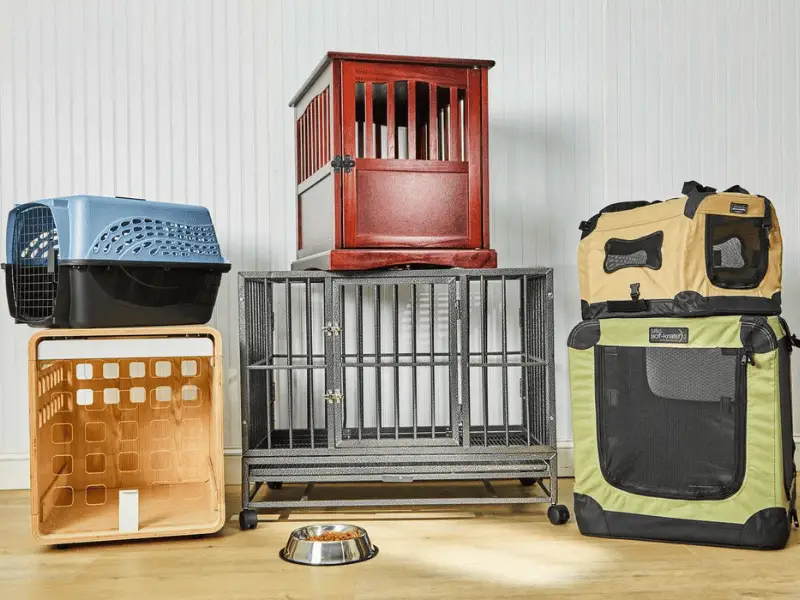
Leave a Reply